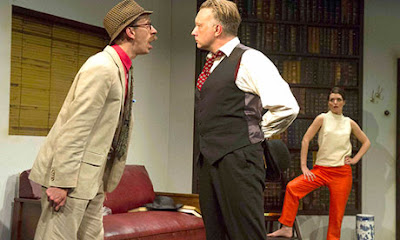Opera
della Luna at the New Wolsey Theatre, Ipswich
09.05.2014
The
Venetian Initiative sees Opera della Luna, that iconoclastic, hugely
entertaining pocket opera company, taking the Gilbert and Sullivan
gospel into the community. In its most ambitious venture yet, with
Arts Council funding, they are recruiting a team of young
music-theatre performers for each venue, opening in Ipswich before
moving up for a week in the Lowry, Salford.
They've
chosen The Gondoliers, the last of the Savoy Opera successes, richly
scored, with a clever blend of satire and Latin charm.
Perversely,
perhaps because this is basically the production Jeff Clarke did for
Buxton a couple of years ago, they've chosen to play it relatively
straight. None of their usual spin, no googlies, little of their
traditional invention born of necessity.
Money
has been well spent. We are greeted with a familiar Venetian skyline,
gondolas in front, lovely flown pieces of architectural detail, and a
stage filled with those “roses white and roses red” which will
spell out not only the names of favourite gondoliers, but, cheekily,
AMORE, OMG and more. And for Act Two, after a protracted interval, a
gloriously baroque Barataria, gilded mouldings and a magnificent
throne, which swivels to reveal the Inquisitor's torture chamber for
the dénouement.
The
frocks are fabulous, too – the Duchess's generous gown, needing a
divan all to itself, traditional garb for the nobs, but a more modern
look for the contadine:
flowery prints with matching galoshes [Venice being wet underfoot,
presumably].
The
opening sequence is splendid, with the gondoliers in sexy dark
glasses given some impressively macho dance moves.
Elsewhere
the inspiration is uneven: the jointly ruling monarchs – sharing
the role and the regalia – were a tad dull in their “pleasures of
a king” number, but the rhythmic boot blacking and spud bashing
works wonderfully for Take A Pair Of Sparkling Eyes. Good use is made
of freeze motion moments.
It
is a great cast: Greg Castiglioni as Luiz, the rightful king, and
Victoria Joyce in fine voice as his Casilda. Stephen Brown and Robert
Gildon make likeable republican royalty, with Maria Jones and Lynsey
Docherty strongly characterized as their feisty rustic wives.
Traditional
G&S performances from Kristin Finnigan as an imposing Duchess
[her big number a highlight] and Carl Sanderson as a very British
hidalgo. Opera della Luna favourite Ian Belsey does not disappoint as
Don Alhambra, the dialogue and the vocals richly relished, wearing
the kind of character slap you don't see so often nowadays.
The
locally sourced chorus fill the stage nicely, and are given dance
routines and individual characters to work with.
Perhaps
not “travelling with a full band”, but an excellent palm court
pit ensemble, with director Jeff Clarke at the piano as usual.
On
opening night there were one of two glitches and uncertainties, and
the lighting was patchy. It's a big production for Opera della Luna,
and will bed in nicely at the Lowry, I'm sure.
Musical
theatre has an enthusiastic following amongst young people.
Fuddy-duddy G&S less so. This laudable initiative aims to redress
the balance. But I still can't help thinking that a less
straightforward treatment, perhaps along the lines of their catwalk
Mikado, might be a more accessible way into the Savoy canon.
photograph from the Buxton production
this piece first appeared on The Public Reviews










